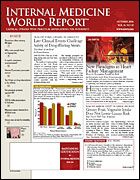Publication
Article
The Genetic Component in hf
Author(s):
Potential for New Therapies, Prevention Efforts
N Engl J Med
Dilated cardiomyopathy is known to be a familial condition, but the heritability of other cardiovascular conditions is not quite as clear. Now a new study (. 2006; 355:138-147) has found that if a parent has heart failure (HF), his or her children are at increased risk of a significant echocardiographic precursor of HF, as well as of overt HF.
The cross-sectional association between HF in parents and left ventricular (LV) systolic dysfunction in their children was evaluated in 1497 Framingham Offspring Study participants (819 women; mean age, 57 years) who underwent regular echocardiography.
A prospective evaluation to determine whether parental HF increased risk of HF in offspring included 2214 individuals (1150 women; mean age, 44 years).
About twice as many offspring whose parents had HF had LV systolic dysfunction on echocardiography (Table).
During a mean follow-up of 20 years, 90 offspring developed HF—44 cases of ischemic HF and 46 cases of nonischemic HF. Among the parents, 327 had ischemic and 371 had nonischemic HF.
Multivariate analysis determined that parental ischemic HF increased risk of any HF, ischemic HF or nonischemic HF, in the offspring. Parental nonischemic HF was not associated with ischemic HF in children, although there was a statistically nonsignificant trend toward higher risk of nonischemic HF.
After adjusting for known risk factors (including increased LV mass), parental HF increased the risk of overt HF in the offspring by 70% compared with no parental HF.
Even when considering only individuals whose onset of HF was at age 75 years or who had neither myocardial infarction nor valve disease, the association between parental HF and increased risk in offspring persisted.
Overall, parental HF was responsible for about 18% of the HF burden in the offspring.
The investigators conclude that these results suggest, but do not establish, a relationship between genetics and HF. Confirmation of such an association could offer a promising new target for preventive interventions.






